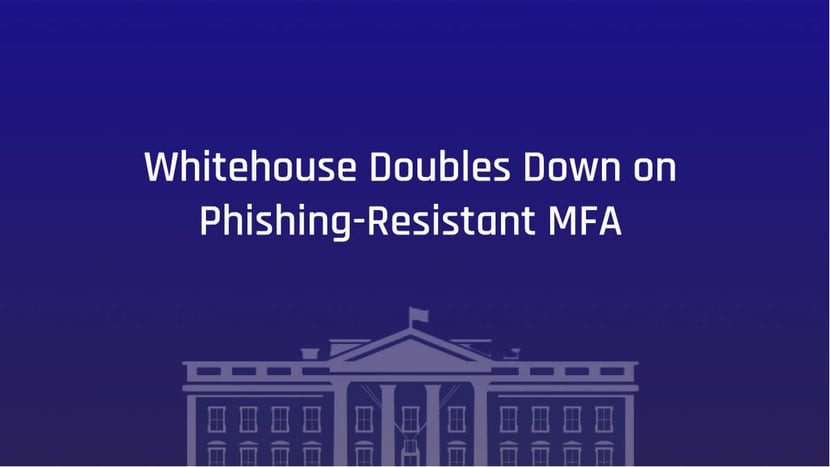Whitehouse Doubles Down on the Imperative for Phishing-Resistant MFA

In today’s online world, the importance of robust cybersecurity measures cannot be overstated. Cyber threats continue to evolve, and organizations, both public and private, face a constant battle to protect sensitive data from malicious actors. Yesterday, a significant event, the Multifactor Authentication (MFA) Modernization Symposium, was jointly hosted by the Office of Management and Budget, the Office of the National Cyber Director, the National Security Council, and the Cybersecurity and Infrastructure Security Agency. This symposium brought together industry and government leaders to discuss the urgent need for advancing phishing-resistant authentication. As organizations contemplate how to best protect their organization, the symposium’s insights serve as a powerful driving factor to adopt passwordless MFA now.
The Time for Modern Authentication Is Now
Federal Chief Information Officer Clare Martorana captured the essence of the symposium’s purpose — to deliver a positive, intuitive and trusted digital experience for users. Modernizing authentication methods is a key aspect of achieving this goal. The traditional reliance on passwords has proven inadequate in deterring cyber threats. Cybercriminals have become adept at exploiting password vulnerabilities through phishing attacks, social engineering, and data breaches. As a result, adopting passwordless MFA is crucial in creating a resilient cybersecurity framework.
Simplicity and Security Should Not Be Mutually Exclusive
Federal CISO and Deputy National Cyber Director Chris DeRusha highlighted that security doesn’t have to be complex to be effective. In fact, passwordless MFA, including passkeys, offers a simple yet strong methodology to protect organizations. By requiring multiple factors for user verification, passwordless MFA significantly reduces the risk of unauthorized access.
Implementing MFA not only strengthens security but also aligns with the President’s Executive Order on cybersecurity. This alignment reinforces the notion that securing the authentication process, data and systems is a collective responsibility that extends to both public and private sectors.
Collaborative Technology Strategies
The symposium showcased the importance of collaboration between public and private sectors to develop an interoperable and user-friendly MFA ecosystem. By combining efforts, organizations can learn from each other’s best practices and collectively address shared security goals. Doing so enables in-depth discussions about contemporary MFA technologies and their potential impact.
The Vision for a Safer Future
Deputy National Security Advisor for Cyber and Emerging Technologies Anne Neuberger called for identifying and addressing barriers to MFA adoption indicates the government’s determination to support organizations in their quest for enhanced cybersecurity. As organizations embrace MFA, they not only protect their interests but also contribute to the nation’s overall cyber defense strategy.
Conclusion
In light of the recent Multifactor Authentication (MFA) Modernization Symposium and the resounding calls for embracing MFA, the time is now for organizations to adopt passwordless, phishing-resistant MFA. The prevailing cyber threats demand a shift away from reliance on passwords and towards stronger, multi-factor authentication methods. As the public and private sectors collaborate to develop interoperable and user-friendly MFA ecosystems, organizations can better safeguard their digital assets and provide users with a seamless and secure online experience.
By aligning their technology strategies with contemporary MFA technologies and policies, organizations contribute not only to their own security but also to the overall cybersecurity landscape of the nation. Through collective efforts, we can build a more resilient and secure digital future.
![]()
*** This is a Security Bloggers Network syndicated blog from HYPR Blog authored by Michael Rothschild, VP of Product Marketing, HYPR. Read the original post at: https://blog.hypr.com/whitehouse-imperative-for-phishing-resistant-mfa



